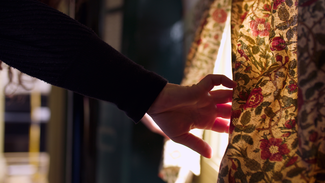Hold Out a Hand

Please be aware this film and article contains conversations about suicide
‘Hold Out a Hand is a powerful short film that we hope will stimulate conversations about mental health and suicide within the Gypsy and Traveller community and also encourage people to reach out to engage with mental health and suicide prevention support services.
“We are making them feel that they can’t reach out, they can’t ask for that help, they can’t say ‘look I’m really feeling a bit down’ because what will we say – ‘oh pull yourself together!’,” says Romany Gypsy Donna, whose son Jimmy died by suicie. “That’s how I’ve been brought up. Nobody should feel that the only option is to die. There is no shame. No shame at all. It’s powerful to admit that you are struggling and you need help.”
Donna is one of two Travellers who speak about their personal experiences of suicided in Hold out a Hand, alongside Tom and also Irish Traveller Jose O’Driscoll, CEO of GATEHerts (Gypsy and Traveller Empowerment in Hertfordshire), who speaks about her professional experience.
“It wasn’t one big thing with my dad, it was lots of little things over the years that broke him I think,” says Tom. “He came from a hard household. He tried his best not to give us that environment, but sometimes it crept through. As I grew up, we became very close. He was a lot of fun, and he had suffered a few personal tragedies himself. He really did do his best. He did struggle with it, but he did his best.”
Hold out a Hand was commissioned by Worcestershire County Council Public Health and builds on work already carried out by GATEHerts, Traveller Movement, LeedsGATE (Leeds Gypsy and Traveller Exchange), research conducted by Friends, Families and Travellers and uses contacts that were developed through the Travellers’ Times. The film is also intended for a national audience and comes with a report for mainstream service providers that will enable them to improve their accessibility to Gypsy and Traveller people.
Sometimes it takes a while for people to open up,” says Josie O’Driscoll. “They might know you; they might know some of your family, and they don’t always want to speak. But if you encourage them and have open days like coffee mornings and things like that where the women can speak to each other. People in mainstream don’t understand their issues, don’t understand their culture, so we got to get that right first before people will open up to mainstream services.” We have always had suicide in the male community, but in the last five or ten years it’s been young girls as well, adds Josie O’Driscoll.
Official data shows that Irish Traveller people living in Ireland are over six times as likely to die by suicide. It is widely believed that the figures in England, Scotland and Wales are similar and that the Government can and should be taking action to address this.
“When I was younger, we weren’t ashamed of where we come from but sometimes, we would have to cover it up for fear of persecution,” says Tom. “In the past I’ve hid that I’m a Traveller because I was afraid, I wouldn’t get a job. We got picked on at school. But you can’t show fear, if you show fear, you get beaten up. That’s the way it goes throughout your whole life. Luckily my children don’t suffer that persecution. The schools that they go to are run very well and bullying is tackled immediately.”
Data on deaths by suicide in Gypsy and Traveller communities is not collected in England, Scotland and Wales and this means the Government know little about how suicide impacts Gypsy and Traveller people. This in turn means that the Government does not have any targeted activities planned to reduce suicides within Gypsy and Traveller communities as it does with other groups such as middle-aged men or people who have served in the army.
“He was a good boy, kind, caring,” says Donna. “He loved his daughter. He loved her so much. He was a plasterer and he was good at it. Every day he would drive in and even if he didn’t get out of it, he would sit in his van, smoking, but we would see him every day. He didn’t ring me that night. He had his phone and he didn’t ring me. I just don’t understand why he didn’t because he knows I would have gone to him. Still we sit and we watch that gate. We know he’s not coming. But it doesn’t stop us.”
Talking can help, you are not alone - Help is available
One Call Away (Gypsy & Traveller confidential support) 07748 997617
Samaritans 116 123
Herefordshire and Worcestershire Urgent Mental Health Helpline 0808 196 9127
Our research report can be downloaded HERE
Our thanks to our good friends at Hartlebury Museum for allowing us to film in the grounds and Vardo shed